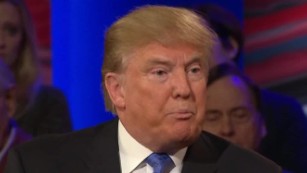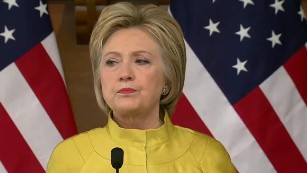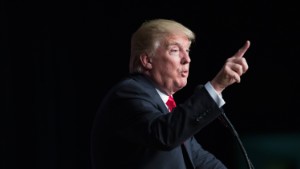Trump looks to pass commander-in-chief test as rivals see weakness
Donald Trump is suddenly confronted with a test faced by every candidate with serious designs on the White House: He must prove he's fit and ready to be commander in chief.
The real estate mogul has drawn attention to his readiness and knowledge of national security with a series of controversial comments over the past several weeks critical of decades of U.S. strategic orthodoxy pursued by Republicans and Democrats alike.
Despite mounting criticism from party opponents and stalwarts, he showed no interest in backing down Monday. He threatened to "walk" out on U.S. allies Japan and South Korea if they did not pay more for American protection and demanded "delinquency" payments from Europe.
"You have to be prepared to walk," he said at a rally in Wisconsin on the eve of the state's primary vote.
Trump on potential war between Japan and North Korea: 'If they do, they do'
He continued, "We have got to do something as an example with NATO because of all of these countries that are getting a free ride, they have got to pay up."
Previously, Trump has called NATO "obsolete," called for foreign Muslims to be banned from the U.S. and thrown accepted nuclear doctrine into question.
Trump's rivals in the Republican nominating contest as well as his most likely general election foe, Democrat Hillary Clinton, sense an opening and are using his recent statements to suggest he lacks the expertise and the temperament to be president.
Ohio Gov. John Kasich said that Trump's remarks about nuclear policy and NATO, in addition to a separate flap over his comments on abortion, raised questions about his qualifications to be president.
"These are things that show that Mr. Trump is unprepared," Kasich said on CNN's "Smerconish" show on Saturday.

South Korea and Japan respond to Donald Trump
While foreign policy rarely decides a presidential election and Trump's faithful voters seem unlikely to desert him over the issue, potential presidents have historically had to overcome a minimum threshold to show they are ready to deal with the demands of the White House Situation Room -- and nominees take pains to prove their readiness and experience, lest they fall short.
Then-Sen. Barack Obama traveled to the Middle East and Europe in the summer of 2008 to prove he was ready for the world stage. In 2004, Democratic nominee John Kerry touted his service in Vietnam to prove he was ready to be a war president but was undermined by attacks from President George W. Bush's campaign. And in 1988, Democratic nominee Michael Dukakis appeared in an awkward photo-op aboard a tank; many pointed to that moment as when the Massachusetts governor failed to pass the commander-in-chief test.
So Trump's recent performance, which has horrified the GOP national security establishment, has piled pressure on the Republican front-runner to justify his ideas. He needs to prove that by effectively tearing up the post-World War II national security compact in favor of a foreign policy based on what he describes as making better deals for America, he can make the nation safer and more prosperous.
Obama, in an unusual intervention from an incumbent president about a potential successor's qualifications for the job, put the question of Trump's foreign policy competence at the center of the political debate on Friday.
White House goes nuclear on Trump: An evolution
The President, who has made halting proliferation a centerpiece of his foreign policy, said at a nuclear conference in Washington that Trump didn't know much about the Korean Peninsula, foreign policy or the world, and warned that he was not up to the task of leading the United States and its allies.
"Even ... those countries that are used to a carnival atmosphere in their own politics want sobriety and clarity when it comes to U.S. elections because they understand the President of the United States needs to know what's going on around the world and has to put in place the kinds of policies that lead not only to our security and prosperity, but will have an impact on everybody else's security and prosperity," Obama said.
And after meeting NATO Secretary General Jens Stoltenberg on Monday, Obama mounted an extended defense of the alliance that did not mention Trump but seemed motivated by a desire to stress the breadth of NATO operations and to reassure allies.
"NATO continues to be the linchpin and cornerstone of our collective defense and U.S. security policy," Obama said, hailing the alliance's role in training troops to take on ISIS in the Middle East, its operations in Afghanistan and support of Eastern European allies unsettled by a more assertive Russia. He said he was confident that despite "choppy waters" internationally, NATO would "underscore and underwrite" new decades of peace, security and prosperity.
Some Republicans also worry
It is not only Democrats who are trumpeting alarm at Trump running the White House.
Trump: I'll eliminate U.S. debt by end of 2nd term
Many Republican foreign policy veterans are already contemplating what having Trump as the nominee would mean not just in a general election clash against Clinton -- who would use her experience as secretary of state to suggest she is ideally prepared to be president -- but for U.S. foreign policy as a whole.
Kori Schake, who served in the Republican administration of George W. Bush, said that Trump would offer a poor contrast to the former secretary of state.
"It will be impossible for Donald Trump as the Republican candidate to pick up any ground against Hillary Clinton on national security. All she will have to say is 'steady, positive relations benefit the United States and the world," said Schake, who is now at the Hoover Institution at Stanford University.
"He looks like he will be a crisis a week in foreign policy," Schake said. "If the American people are at all anxious about how dangerous the world seems, he will make it seem more dangerous."
Obama: Trump 'doesn't know much about foreign policy'
Peter Feaver, a former senior member of Bush's National Security Council, acknowledged that Trump's comments on foreign policy are unlikely to shake the loyalty of his grass-roots supporters. But he said that Trump could have already compromised himself with other voters.
"The commander-in-chief test clearly matters for the others in the rest of the Republican electorate, and then the large number of swing voters, independents and others that Trump would have to win over to become president," said Feaver, now a professor of political science at Duke University.
"I would go so far as to suggest that he may have irretrievably lost those people. It would be hard to imagine something that he could do that would convince them that he could pass the test," Feaver said. "It may be lost to him at this point."
Clinton team looks forward to the fight
Clinton is not waiting to clinch the Democratic nomination to start positioning herself as the most ready to call the shots in the Situation Room after national security re-emerged as a top issue after the Brussels attacks.
She delivered a major address on terrorism, participated in a roundtable with security professionals and had national security heavyweights brief reporters on her policies.
White House on questions about Trump: Bring 'em on
"Our new commander in chief will walk into the Oval Office and find a world of hard choices and complex problems," Clinton said in a major speech on counterterrorism at Stanford University last month, setting up an implicit contrast with Trump.
"That president will sit down at that desk and start making decisions that will affect the lives and livelihoods of every American and people around the world."
Clinton also argued that Trump is temperamentally unsuited to fighting terrorism, a threat that preoccupies many voters.
"What America needs is strong, smart, steady leadership to wage and win this struggle," Clinton said in her Stanford speech.
The Clinton campaign is looking forward to the fight.
"Certainly, if she secures the nomination and ends up facing Donald Trump, her steady, responsible leadership and nuanced understanding of the complex challenges we face around the world will provide a stark contrast" with the GOP front-runner, a Clinton aide not authorized to talk publicly on campaign strategy said on condition of anonymity.

Hillary Clinton: Terrorism 'knows no boundaries'
Trump's campaign was asked to make available a national security aide to discuss a possible general election matchup with Clinton but did not respond.
In a CNN/ORC poll released last month, 55% of those asked said Clinton would be a better commander in chief while 36% chose Trump.
Clinton is looking to emphasize that advantage by presenting herself as a veteran foreign policy practitioner, an important presence in the White House Situation Room and an intimate of world leaders who she has said are spooked by Trump.
Her Stanford speech was the kind of address a president might give in the aftermath of a terrorist attack, offering empathy, reassurance and concrete policy plans.
But in an election year that has rewritten the rules of politics, it is far from clear that national security will be a winning topic for Clinton.
While one candidate, former neurosurgeon Ben Carson, saw his bid for the Republican nomination fade over his liabilities on national security after the Paris attacks last year, both Florida Sen. Marco Rubio and former Florida Gov. Jeb Bush thought their superior national security credentials would derail Trump. They are both now back home in the Sunshine State.
CNN/ORC poll: Clinton tops Trump on presidential traits
Trump's fresh approach and "America first" rhetoric could impress more voters than traditional foreign policy experts think -- especially at a time of deep anxiety over the nation's economy among working- and middle-class voters in a nation that is exhausted by a decade-and-a-half of war abroad."
"You have countries in NATO that are getting a free ride, and it's unfair, it's very unfair," Trump said at a CNN town hall last week. "The United States cannot afford to be the policeman of the world anymore, folks. We have to rebuild our own country."
The billionaire businessman has often pointed to the Paris attacks and a resurgent fear of terrorism as having helped his campaign.
"We started and something happened called Paris. Paris happened and Paris was a disaster," Trump said in Florida earlier this month after a string of presidential primaries. "And what happened with me was, this whole run took on a whole new meaning."
How Trump's general election hopes might be enhanced in the volatile political fallout of fresh terror attacks -- perhaps on U.S. soil -- is hard to game out. But it's possible public panic could generate more receptive audiences for his criticism of Muslims and vows to use torture if necessary to pursue extremists.
And some of Trump's other controversial proposals -- such as building a border wall that Mexico pays for -- horrified the political establishment in Washington but were popular among the former reality TV star's political base.
Trump: Clinton has liabilities
On "Fox News Sunday" in December, Trump offered a preview of his strategy for taking on Clinton. "She's the one that caused all this problem with her stupid policies. You look at what she did with Libya, what she did with Syria. Look at Egypt. What happened with Egypt, a total mess. We don't back any of our allies," Trump said.
"She was truly ... one of the worst secretaries of state in the history of the country," he charged. "She talks about me being dangerous. She's killed hundreds of thousands of people with her stupidity."
Republicans see Clinton as acutely vulnerable for her time as Obama's lieutenant on foreign policy and for her own role in policy-making. They have particularly highlighted her role in the U.S. and allied operation that toppled Libyan dictator Moammar Gadhafi, spawned an ISIS terror haven and ultimately saw the deaths of four Americans in Benghazi in 2012 on her watch. GOP leaders also believe Clinton has deep liabilities over her reset of relations with Russia.
Trump, after basing his campaign on a mantra of making America great again, may be uniquely able to take advantage of the argument that the country has suffered decline under the Obama administration.
He is also preparing to outflank Clinton on free trade, an issue that has haunted her in her battle against Sanders, by raising her husband Bill Clinton's role in ratifying the North America Free Trade Agreement as president that the GOP front-runner has branded "a disaster."
Indeed, he expressed confidence last month that Clinton is the one with bigger vulnerabilities on national security, telling The Washington Post editorial board, "I haven't started on Hillary yet, and when I do, I think I'll be able to make my points."
News Courtesy: www.newagebd.net











